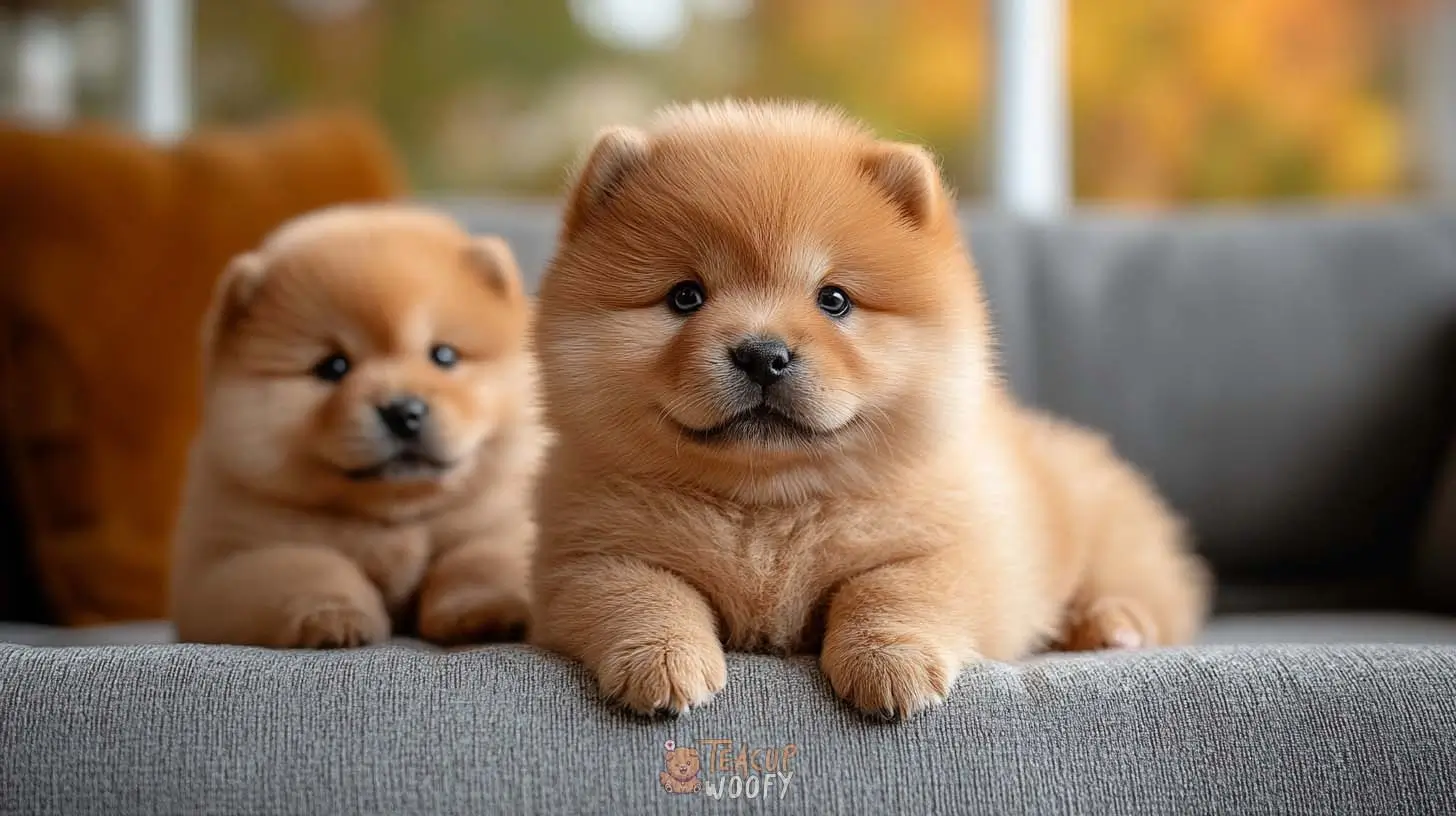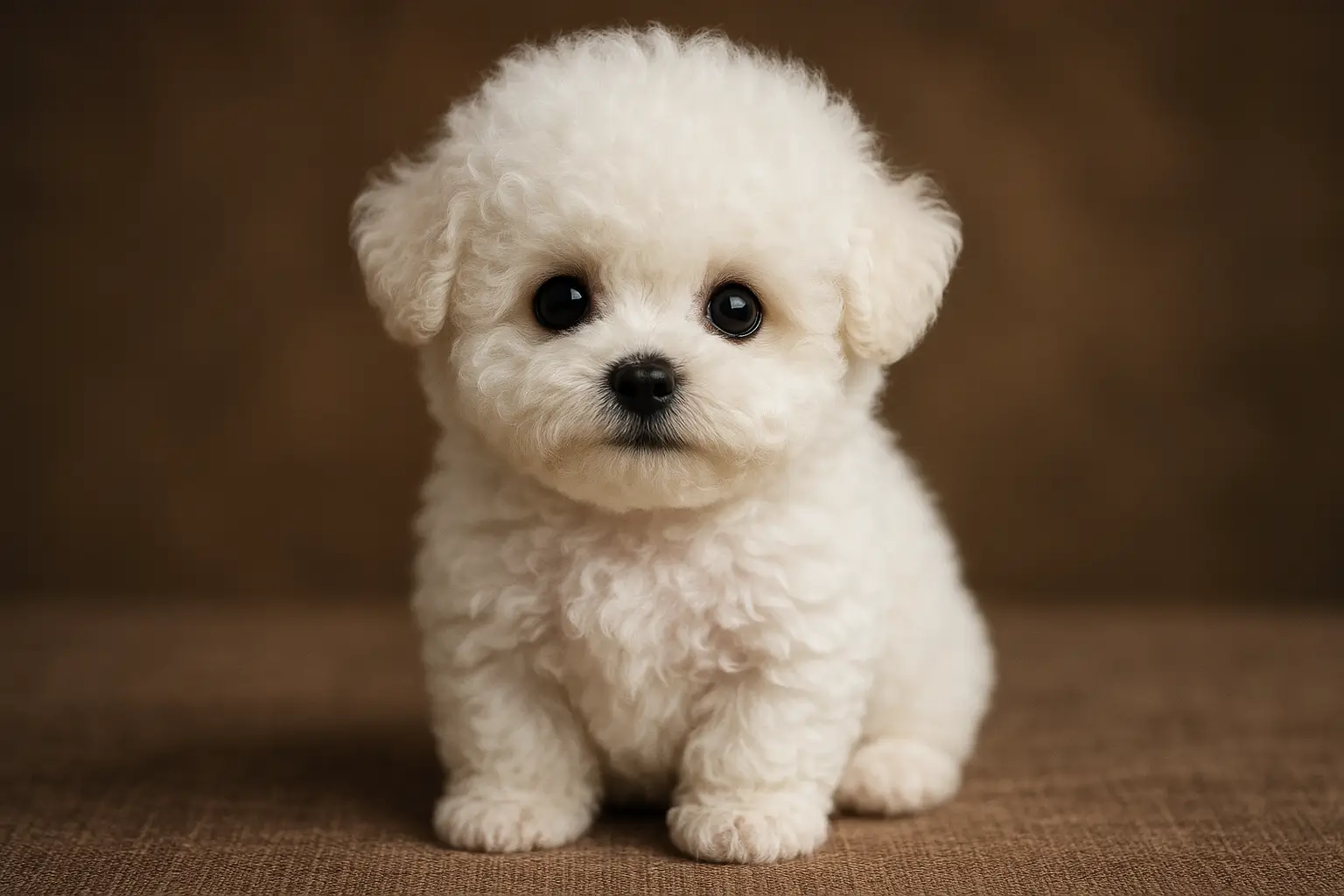Tiny, delicate, and irresistibly cute, teacup dog breeds have become some of the most sought-after pets around the world. Unlike standard breeds, the term “teacup” isn’t officially recognized by kennel clubs like the AKC, it’s more of a marketing label used for dogs breed to be smaller than average.
People love teacup pups because they’re portable, perfect for apartment living, and often look like forever-puppies. But behind the cuteness, there are things to consider, from higher health risks linked to miniaturization to the higher price tags these dogs often carry. Whether you’re curious about a teacup Shih Tzu, Chihuahua, or Pomeranian, knowing the truth about teacup dog breeds helps you decide if these tiny companions are the right fit for your lifestyle.
What Is a Teacup Dog?
When clients ask me about Teacup Dog Breeds, I start by clarifying something important. A teacup dog is not an official breed classification. The term is not recognized by the American Kennel Club or any major veterinary body.
In practice, “teacup” is a marketing label used to describe an unusually small dog, typically bred to be significantly smaller than the standard for its breed. You might see this applied to breeds like Yorkshire Terriers, Chihuahuas, or Pomeranians, but it does not represent a separate, regulated category.
How Size Is Reduced
From what I have seen over the years, size is usually reduced through selective breeding. Breeders may:
- Pair the smallest dogs in a litter repeatedly
- Breed runts together
- Select for early-maturing, smaller-framed dogs
While selective breeding itself is not unethical, aggressively selecting for extreme small size increases the risk of inherited health issues. This is where many problems begin.
Health Considerations
Very small dogs have less physiological reserve. That means they have less room for error when it comes to blood sugar balance, temperature regulation, anesthesia safety, and even minor illness.
Common concerns I discuss with owners include:
- Hypoglycemia, especially in puppies
- Fragile bones and higher fracture risk
- Dental overcrowding
- Heart defects
- Liver shunts
The American Veterinary Medical Association (AVMA) emphasizes responsible breeding practices and prioritizing health over appearance.
When someone is considering Teacup Dog Breeds, I always encourage realistic expectations. Smaller does not mean easier. In many cases, it means more vigilance, more veterinary oversight, and a deeper commitment to preventive care.
Quick Comparison of the Most Popular Teacup Breeds
When families ask me to compare Teacup Dog Breeds, they usually want a fast, honest overview. Below is the same type of summary I give in consultations.
Please remember, “teacup” is not an official classification. These weights reflect dogs marketed as teacup, often under 4 pounds as adults. Lifespan varies widely based on genetics, breeding ethics, and ongoing care.
| Breed | Weight | Lifespan | Hypoallergenic | Avg Price | Monthly Cost | Best For |
|---|---|---|---|---|---|---|
| Teacup Pomeranian | 2–4 lbs | 12–16 yrs | No | $1,500–$4,000 | $150–$300 | Experienced small-dog owners |
| Teacup Chihuahua | 2–4 lbs | 12–18 yrs | No | $800–$3,000 | $120–$250 | Apartments, singles |
| Teacup Yorkie | 2–4 lbs | 12–15 yrs | Low-shedding | $1,500–$3,500 | $150–$300 | Grooming-committed owners |
| Teacup Maltese | 2–4 lbs | 12–15 yrs | Low-shedding | $1,500–$3,500 | $150–$300 | Calm households |
| Teacup Shih Tzu | 3–5 lbs | 10–16 yrs | Low-shedding | $1,200–$3,500 | $150–$300 | Families with supervision |
| Teacup Poodle | 2–4 lbs | 12–16 yrs | Yes | $1,500–$4,000 | $150–$300 | Allergy-sensitive homes |
| Teacup French Bulldog | 5–10 lbs | 10–14 yrs | No | $3,000–$8,000 | $200–$400 | Urban owners, mild activity |
| Teacup Pug | 4–8 lbs | 12–15 yrs | No | $1,200–$3,500 | $150–$300 | Companion-focused homes |
| Teacup Bichon Frise | 3–5 lbs | 12–15 yrs | Yes | $1,500–$3,500 | $150–$300 | Allergy-sensitive families |
| Teacup Mini Dachshund | 3–6 lbs | 12–16 yrs | No | $1,000–$3,000 | $150–$300 | Patient, consistent trainers |
| Teacup Schnauzer | 3–5 lbs | 12–15 yrs | Low-shedding | $1,200–$3,500 | $150–$300 | Alert, interactive owners |
| Teacup Pomsky | 5–9 lbs | 12–15 yrs | No | $2,000–$5,000 | $200–$400 | Active owners |
| Teacup Cavapoo | 4–8 lbs | 12–15 yrs | Often low-shedding | $1,500–$4,000 | $150–$300 | Families, first-time owners |
| Teacup Morkie | 3–5 lbs | 10–15 yrs | Low-shedding | $1,000–$3,000 | $150–$300 | Small-space living |
| Teacup Yorkipoo | 3–6 lbs | 12–15 yrs | Often low-shedding | $1,200–$3,500 | $150–$300 | Apartment dwellers |
| Teacup Zuchon | 4–8 lbs | 12–15 yrs | Often low-shedding | $1,500–$3,500 | $150–$300 | Companion households |
The 16 Most Popular Teacup Dog Breeds
1. Teacup Pomeranian
The Teacup Pomeranian is one of the most requested among Teacup Dog Breeds, mostly because of its fox-like face, full coat, and confident personality. Despite the tiny size, this dog rarely acts small. Most are alert, expressive, and surprisingly bold.
Personality-wise, I describe them as lively and very people-focused. They bond closely with one or two individuals and can become protective if not socialized early. Many owners underestimate how vocal they can be. Early training makes a big difference.
This dog is best suited for adults, older children who understand gentle handling, and apartment dwellers who want an interactive companion. They are not ideal for homes with rough play or large, unpredictable dogs.
Their popularity comes from their teddy bear appearance and strong presence in small spaces.
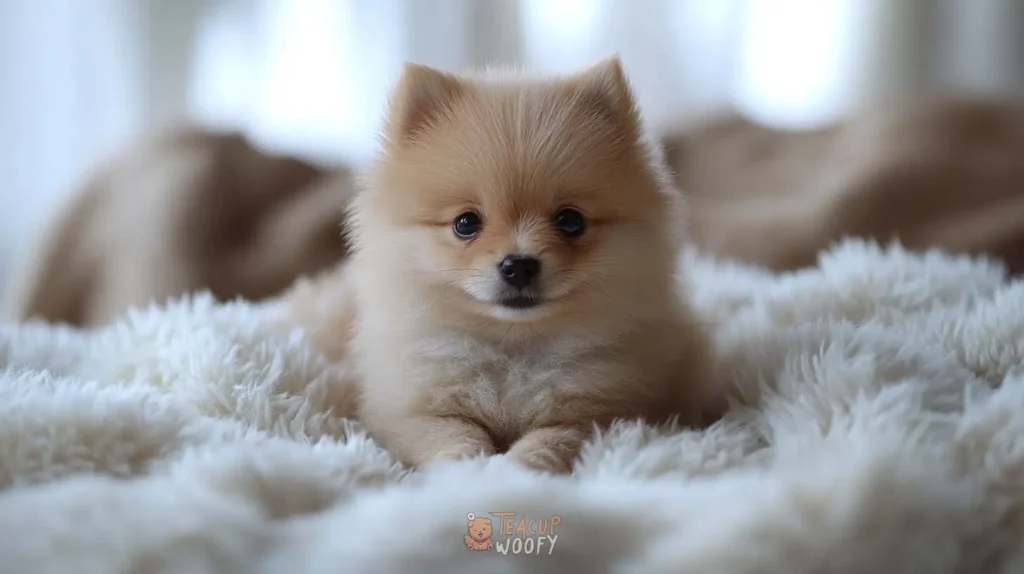
| Category | Details |
|---|---|
| Weight | 2–3 lbs |
| Lifespan | 12–16 yrs |
| Coat Type | Thick double coat |
| Hypoallergenic | No |
| Average Price | $1,500–$5,000 |
| Monthly Cost | $100–$180 |
| Good for Apartments | Yes |
Temperament & Personality
In my experience, the Teacup Pomeranian is confident, alert, and highly attached to its person. They often act much bigger than they are. I see strong loyalty, quick intelligence, and a tendency to be vocal if not properly trained. Early socialization matters because they can become overly protective or suspicious of strangers. With consistent boundaries and gentle handling, they are affectionate companions who thrive on close interaction and mental stimulation.
How Much Does a Teacup Pomeranian Cost?
In my experience, a Teacup Pomeranian typically costs $1,500 to $5,000 upfront, depending on breeder quality and lineage.
Ongoing expenses usually range from $100 to $180 per month, covering food, grooming, routine veterinary care, and preventive treatments.
Is Teacup Pomeranian the Right Breed for You?
In my experience, the Teacup Pomeranian is best for owners who want a lively, attached companion and can provide close supervision. If you live in an apartment, enjoy daily interaction, and understand the medical sensitivities of very small dogs, this breed can thrive with you. It is not ideal for homes with rough handling or unpredictable environments.
2. Teacup Chihuahua
The Teacup Chihuahua is one of the smallest among Teacup Dog Breeds, and in my practice, it is often chosen by owners who want a deeply loyal companion in a tiny package. Despite their size, their personality is strong. Most are alert, confident, and extremely attached to their primary person. They tend to bond intensely and can become protective if not properly socialized.
This breed is best suited for adults, seniors, or calm households where handling is gentle and consistent. They adapt well to apartment living and do not require large spaces, but they do need structured boundaries and early training to prevent excessive barking or territorial behavior.
Their popularity comes from their portability, expressive faces, and long lifespan compared to many other small breeds.
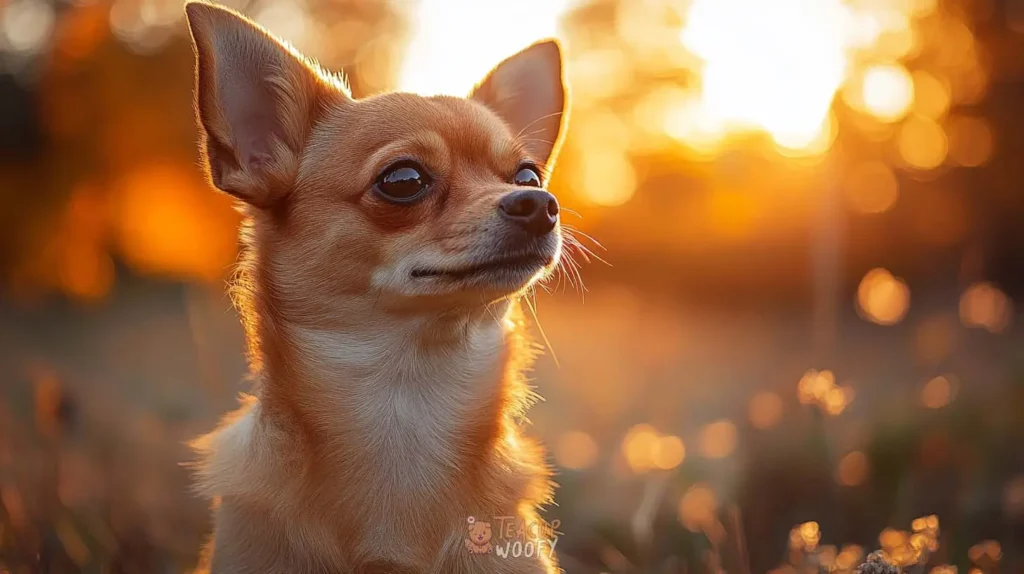
| Category | Details |
|---|---|
| Weight | 2–3 lbs |
| Lifespan | 12–16 yrs |
| Coat Type | Smooth or long coat |
| Hypoallergenic | No |
| Average Price | $800–$3,000 |
| Monthly Cost | $100–$180 |
| Good for Apartments | Yes |
Temperament & Personality
The Teacup Chihuahua is bold, alert, and deeply loyal to its person. They often bond closely with one individual and can become protective if early socialization is skipped. Despite their tiny size, they carry themselves with confidence and strong opinions. With consistent training and calm handling, they grow into affectionate, devoted companions who do best in structured, predictable homes.
How Much Does a Teacup Chihuahua Cost?
A Teacup Chihuahua typically costs $800 to $3,000 upfront, depending on breeder reputation and bloodline.
Monthly expenses usually range from $100 to $180, covering food, routine veterinary care, parasite prevention, and basic supplies. I always advise setting aside additional savings for unexpected medical needs, as very small dogs can require closer monitoring.
Is Teacup Chihuahua the Right Breed for You?
The Teacup Chihuahua is a good fit if you want a highly attached, portable companion and can provide a calm, structured environment. They do best with gentle handling and consistent boundaries. If you prefer an independent dog or have young children who play roughly, this may not be the ideal match.
3. Teacup Yorkshire Terrier
The Teacup Yorkshire Terrier is one of the most requested among Teacup Dog Breeds, largely because of its elegant coat and lively personality. Although tiny, this dog is confident, alert, and surprisingly determined. Yorkies tend to be very people-oriented and enjoy being involved in daily routines. They are intelligent and respond well to training, but they can also develop stubborn habits if boundaries are inconsistent.
This breed is best suited for adults, older children who understand gentle handling, and apartment dwellers who want an interactive companion. They thrive in homes where grooming is taken seriously, as their fine, silky coat requires regular brushing and maintenance.
Their popularity comes from their glamorous appearance, minimal shedding, and adaptable size. Many families are drawn to the combination of a small frame and a big personality. With proper care and structure, they can be affectionate, loyal companions who bond closely with their household.

| Category | Details |
|---|---|
| Weight | 2–4 lbs |
| Lifespan | 12–15 yrs |
| Coat Type | Fine, silky single coat |
| Hypoallergenic | Low-shedding |
| Average Price | $1,500–$4,000 |
| Monthly Cost | $120–$200 |
| Good for Apartments | Yes |
Temperament & Personality
The Teacup Yorkshire Terrier is spirited, intelligent, and very people-focused. They tend to bond closely with their household and enjoy being involved in daily activity. Despite their small size, they are confident and can be vocal if not properly trained. With consistent structure and early socialization, they become affectionate companions who thrive on attention and interaction.
How Much Does a Teacup Yorkshire Terrier Cost?
A Teacup Yorkshire Terrier typically costs $1,500 to $4,000 upfront, depending on breeder quality and lineage.
Monthly expenses usually range from $120 to $200, covering food, routine veterinary care, grooming, and preventive treatments. Regular coat maintenance is a consistent part of the ongoing cost with this breed.
Is Teacup Yorkshire Terrier the Right Breed for You?
The Teacup Yorkshire Terrier is a strong match if you want a small but confident companion who enjoys attention and daily interaction. They fit well in apartments and structured households that can commit to regular grooming. If you prefer a low-maintenance coat or a very quiet dog, this may not be the best choice.
4. Teacup Maltese
The Teacup Maltese is often chosen for its gentle expression and flowing white coat. Among Teacup Dog Breeds, this one is known for being affectionate and people-oriented. Most Maltese I see in practice are calm, attentive, and deeply attached to their owners. They enjoy close contact and tend to thrive when they are part of daily routines rather than left alone for long periods.
This breed is well suited for apartment living, seniors, and families with older children who understand careful handling. They prefer stable, quiet environments and consistent companionship. While small, they are alert and intelligent, and they respond well to gentle, positive training.
Their popularity comes from their elegant appearance, low shedding coat, and adaptable temperament. Many families appreciate that they combine a soft personality with a manageable size. With proper grooming and attentive care, they can be devoted companions who stay closely bonded to their household.

| Category | Details |
|---|---|
| Weight | 2–4 lbs |
| Lifespan | 12–15 yrs |
| Coat Type | Long, silky single coat |
| Hypoallergenic | Low-shedding |
| Average Price | $1,500–$4,000 |
| Monthly Cost | $120–$200 |
| Good for Apartments | Yes |
Temperament & Personality
The Teacup Maltese is gentle, affectionate, and strongly people-oriented. They tend to form close bonds and prefer being near their owner rather than left alone for long periods. Most are calm but alert, making them attentive companions without being overly demanding. With consistent routines and soft handling, they develop into devoted, emotionally responsive little dogs.
How Much Does a Teacup Maltese Cost?
A Teacup Maltese typically costs $1,500 to $4,000 upfront, depending on breeder reputation and lineage.
Monthly expenses usually range from $120 to $200, covering food, routine veterinary care, grooming, and preventive treatments. Regular coat maintenance is an ongoing part of owning this breed.
5. Teacup Shih Tzu
The Teacup Shih Tzu is often chosen for its sweet expression and affectionate nature. Among Teacup Dog Breeds, this one is known for being companion-focused rather than high energy. Most Shih Tzus I see are friendly, people-oriented, and comfortable in smaller living spaces. They enjoy attention and tend to follow their owners from room to room.
Personality-wise, they are typically gentle and adaptable. They are not intense working dogs, but they do benefit from basic training and structure. Without guidance, they can become stubborn or overly dependent.
This breed suits families, apartment dwellers, and seniors who want a calm lap companion. They do best in homes where grooming is taken seriously, as their coat requires regular care.
Their popularity comes from their soft temperament, manageable size, and expressive face. With attentive care and realistic expectations, they make loyal household companions.
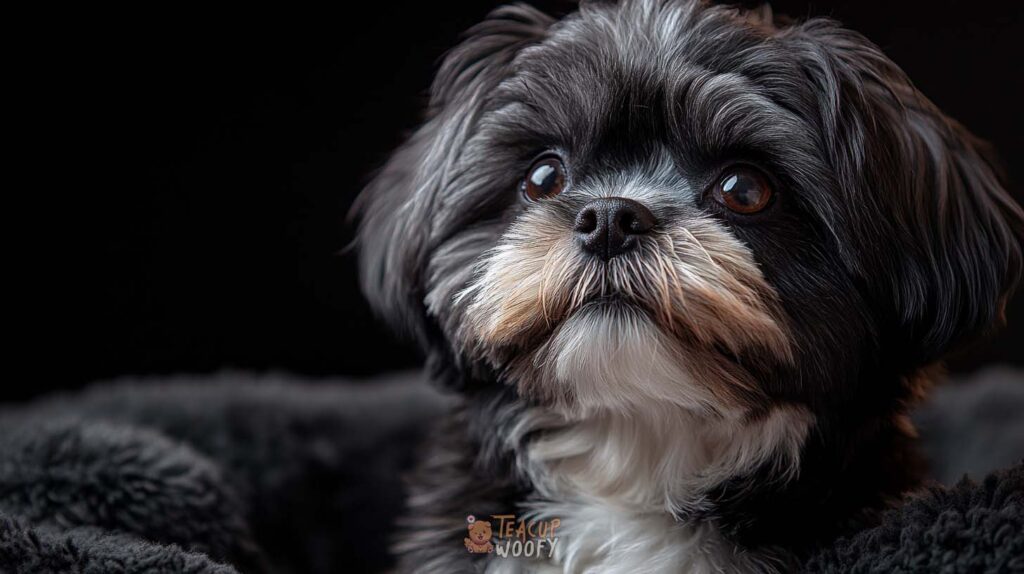
| Category | Details |
|---|---|
| Weight | 3–5 lbs |
| Lifespan | 10–16 yrs |
| Coat Type | Long, dense double coat |
| Hypoallergenic | Low-shedding |
| Average Price | $1,200–$3,500 |
| Monthly Cost | $120–$200 |
| Good for Apartments | Yes |
Temperament & Personality
The Teacup Shih Tzu is affectionate, calm, and strongly companion-oriented. They typically enjoy being close to their family and are happiest when included in daily routines. Most are gentle and adaptable, making them suitable for apartments and quieter households. With consistent structure and early socialization, they develop into loyal, easygoing lap dogs rather than overly dependent companions.
How Much Does a Teacup Shih Tzu Cost?
A Teacup Shih Tzu typically costs $1,200 to $3,500 upfront, depending on breeder quality and lineage.
Monthly care usually runs $120 to $200, covering food, routine vet care, grooming, and preventive treatments. Ongoing coat maintenance is a consistent part of owning this breed.
Is Teacup Shih Tzu the Right Breed for You?
The Teacup Shih Tzu is a good fit if you want a calm, affectionate companion who enjoys close contact and indoor living. They do well in apartments and steady households that can commit to regular grooming. If you prefer a highly athletic or low-maintenance dog, this may not be the right match.
6. Teacup Toy Poodle
The Teacup Toy Poodle is often chosen for its intelligence and elegant appearance. Among Teacup Dog Breeds, this one stands out for mental sharpness and trainability. Most of these tiny Poodles are alert, responsive, and eager to engage with their owners. They tend to bond closely and thrive when given structure and stimulation rather than being treated like fragile ornaments.
Personality-wise, they are active for their size. They enjoy learning, short play sessions, and interactive time. Without mental engagement, I sometimes see boredom behaviors such as excessive barking or clinginess.
This breed is well suited for apartment living, first-time small dog owners who are committed to training, and families with older children who handle gently. They are also popular in allergy-sensitive homes because of their low-shedding coat.
Their popularity comes from the combination of intelligence, compact size, and coat versatility. With proper care and realistic expectations, they can be lively, devoted companions.
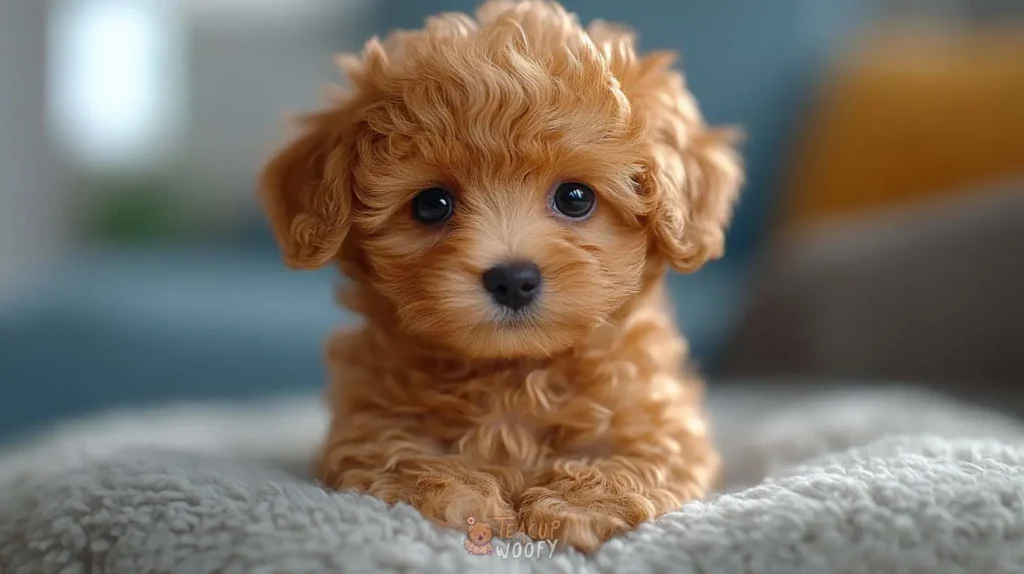
| Category | Details |
|---|---|
| Weight | 2–4 lbs |
| Lifespan | 12–16 yrs |
| Coat Type | Curly, single coat |
| Hypoallergenic | Yes, low-shedding |
| Average Price | $1,500–$4,000 |
| Monthly Cost | $120–$200 |
| Good for Apartments | Yes |
Temperament & Personality
The Teacup Toy Poodle is highly intelligent, alert, and eager to engage. They respond quickly to training and enjoy learning new cues, even at a very small size. Most are affectionate and bond closely with their household, but they also need mental stimulation to stay balanced. With structure and daily interaction, they develop into responsive, attentive companions rather than anxious or overly vocal dogs.
How Much Does a Teacup Toy Poodle Cost?
A Teacup Toy Poodle typically costs $1,500 to $4,000 upfront, depending on breeder reputation and lineage.
Monthly care usually runs $120 to $200, covering food, routine veterinary care, grooming, and preventive treatments. Regular professional grooming is often part of the ongoing cost due to their curly coat.
Is Teacup Toy Poodle the Right Breed for You?
The Teacup Toy Poodle is a strong fit if you want a small dog that is intelligent, trainable, and actively engaged with you. They do best with owners who enjoy interaction and can provide mental stimulation, not just cuddles. If you prefer a very low-effort companion with minimal grooming needs, this may not be the right choice.
7. Teacup French Bulldog
The Teacup French Bulldog is often requested because of its compact body, large ears, and expressive face. Within Teacup Dog Breeds, this one is known for being affectionate, social, and strongly companion-driven. Most French Bulldogs I see are playful but not overly energetic. They enjoy short bursts of activity followed by long periods of rest near their owners.
Personality-wise, they are typically friendly and adaptable. They bond closely with their household and often do well in apartments due to their moderate activity level. However, they thrive on human interaction and may struggle if left alone for long stretches.
This breed suits urban dwellers, small households, and families who want a sturdy-feeling companion in a small frame. Their popularity comes from their charming appearance and easygoing temperament.
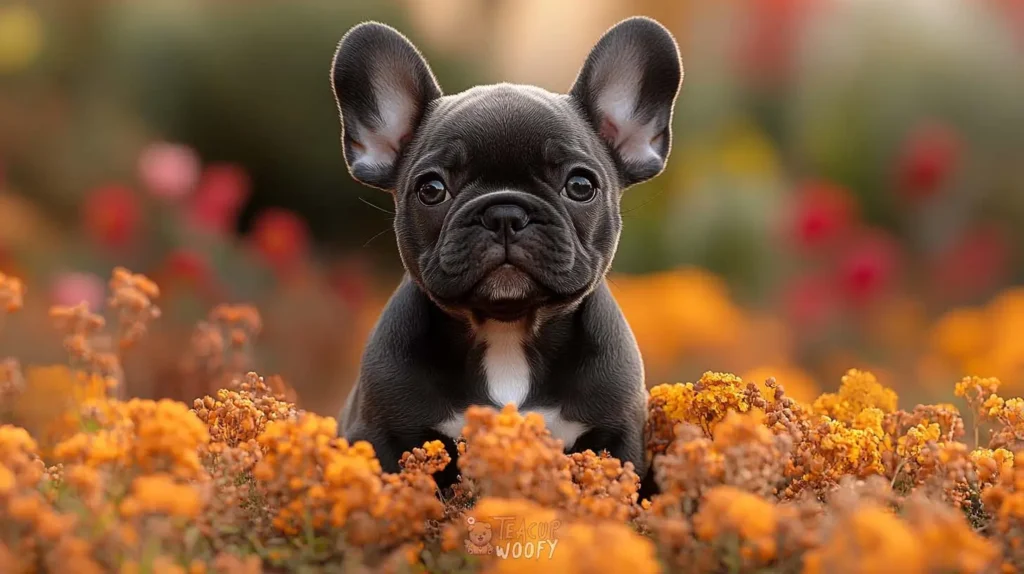
| Category | Details |
|---|---|
| Weight | 5–10 lbs |
| Lifespan | 10–14 yrs |
| Coat Type | Short, smooth coat |
| Hypoallergenic | No |
| Average Price | $3,000–$8,000 |
| Monthly Cost | $180–$300 |
| Good for Apartments | Yes |
Temperament & Personality
The Teacup French Bulldog is affectionate, social, and strongly people-oriented. They typically enjoy close contact and prefer being near their owners rather than left alone for long periods. Most are playful in short bursts but generally calm indoors. With consistent structure and gentle handling, they develop into loyal, easygoing companions suited for apartment living.
How Much Does a Teacup French Bulldog Cost?
A Teacup French Bulldog typically costs $3,000 to $8,000 upfront, depending on breeder reputation and lineage.
Monthly expenses usually range from $180 to $300, covering food, routine veterinary care, preventive treatments, and occasional specialized care due to their brachycephalic features. I also recommend budgeting for extra veterinary monitoring given their potential respiratory sensitivities.
Is Teacup French Bulldog the Right Breed for You?
The Teacup French Bulldog can be a good match if you want a compact, affectionate companion who thrives indoors and enjoys close contact. They suit apartment living and moderate activity levels. However, you must be prepared for potential breathing sensitivities and ongoing veterinary monitoring due to their facial structure.
8. Teacup Pug
The Teacup Pug is often chosen for its expressive face and affectionate nature. Among Teacup Dog Breeds, this one is known for being companion-driven and emotionally connected to its household. Most Pugs I see are friendly, playful in short bursts, and happiest when close to their people.
Personality-wise, they tend to be gentle and sociable. They usually do well with families, seniors, and apartment dwellers, as long as activity is moderate and supervised. They are not high-endurance dogs, and they prefer comfort over intense exercise.
Their popularity comes from their charming appearance, compact size, and easygoing temperament. Many owners are drawn to their clownish expressions and steady companionship.

| Category | Details |
|---|---|
| Weight | 4–8 lbs |
| Lifespan | 12–15 yrs |
| Coat Type | Short, smooth double coat |
| Hypoallergenic | No |
| Average Price | $1,200–$3,500 |
| Monthly Cost | $150–$250 |
| Good for Apartments | Yes |
Temperament & Personality
The Teacup Pug is affectionate, people-focused, and generally easygoing. They enjoy being close to their family and often seek constant companionship. Most are playful in short bursts but prefer comfort and routine over intense activity. With gentle structure and attention, they become loyal, steady companions who thrive in calm indoor environments.
How Much Does a Teacup Pug Cost?
A Teacup Pug usually costs $1,200 to $3,500 upfront, depending on breeder reputation and lineage.
Monthly care typically runs $150 to $250, covering food, routine veterinary care, and preventive treatments. Because of their size and facial structure, I also recommend budgeting for occasional veterinary check-ups and weight management support.
Is Teacup Pug the Right Breed for You?
The Teacup Pug is a good choice if you want a calm, affectionate companion who enjoys indoor living and close contact. They fit well in apartments and family settings with moderate activity. However, you must be prepared to monitor breathing, weight, and heat exposure carefully due to their facial structure.
9. Teacup Bichon Frise
The Teacup Bichon Frise is often chosen for its soft, cloud-like coat and cheerful expression. Among Teacup Dog Breeds, this one is known for being sociable and emotionally responsive. Most Bichons I work with are affectionate, playful without being overwhelming, and highly people-oriented. They tend to enjoy interaction and do not thrive when left alone for long stretches.
Personality-wise, they are typically gentle and adaptable. With early structure and positive training, they become confident, friendly companions. Without guidance, they can develop separation-related behaviors or excessive barking.
This breed suits apartment dwellers, families with older children, and owners looking for a small dog that enjoys engagement without extreme intensity. Their popularity comes from their low-shedding coat and bright, happy demeanor.

| Category | Details |
|---|---|
| Weight | 3–5 lbs |
| Lifespan | 12–15 yrs |
| Coat Type | Curly, double coat |
| Hypoallergenic | Yes, low-shedding |
| Average Price | $1,500–$3,500 |
| Monthly Cost | $120–$200 |
| Good for Apartments | Yes |
Temperament & Personality
The Teacup Bichon Frise is friendly, affectionate, and naturally people-focused. They usually enjoy interaction and tend to adapt well to family routines. Most are playful without being overly intense, but they do need attention and companionship to stay balanced. With consistent structure and early socialization, they grow into confident, cheerful companions who thrive in close-knit households.
How Much Does a Teacup Bichon Frise Cost?
A Teacup Bichon Frise typically costs $1,500 to $3,500 upfront, depending on breeder reputation and lineage.
Monthly care is usually $120 to $200, covering food, routine veterinary checkups, grooming, and preventive treatments. Regular professional grooming is a consistent part of the ongoing cost due to the curly coat.
Is Teacup Bichon Frise the Right Breed for You?
The Teacup Bichon Frise is a good fit if you want a friendly, people-oriented companion who enjoys daily interaction. They do well in apartments and family homes that can commit to regular grooming and companionship. If you are frequently away from home or prefer a very independent dog, this may not be the right match.
10. Teacup Pomsky
The Teacup Pomsky is a small designer mix, typically between a Pomeranian and a Siberian Husky, selectively bred for reduced size. Among Teacup Dog Breeds, this one attracts attention because of its striking coat patterns and Husky-like facial features in a compact body.
Personality can vary more than with established breeds. Some lean toward the playful, vocal, and energetic side like a Husky, while others are more companion-focused like a Pomeranian. They are usually intelligent and alert, and they benefit from early training and clear boundaries.
This dog is best suited for owners who want an engaging, interactive companion and can provide both mental stimulation and supervision. Apartment living can work if activity needs are met consistently.
Their popularity comes from their wolf-like appearance in a very small frame. However, because this is a designer mix and miniaturization adds complexity, temperament and health can be less predictable. Careful breeder selection and realistic expectations are essential.

| Category | Details |
|---|---|
| Weight | 5–9 lbs |
| Lifespan | 12–15 yrs |
| Coat Type | Thick double coat |
| Hypoallergenic | No |
| Average Price | $2,000–$5,000 |
| Monthly Cost | $150–$300 |
| Good for Apartments | Yes, with proper exercise |
Temperament & Personality
The Teacup Pomsky is alert, intelligent, and often more energetic than people expect for its size. Some inherit the playful, vocal traits of the Husky side, while others lean toward the more companion-focused Pomeranian temperament. They usually form strong bonds and enjoy interaction, but they require mental stimulation and clear structure. Without guidance, I sometimes see stubbornness or attention-seeking behaviors develop early.
How Much Does a Teacup Pomsky Cost?
A Teacup Pomsky typically costs $2,000 to $5,000 upfront, depending on breeder reputation and lineage.
Monthly care usually runs $150 to $300, covering food, routine vet checkups, grooming, and preventive treatments. Because their energy and coat care can vary, I recommend planning for interactive toys and occasional professional grooming.
11. Teacup Mini Dachshund
The Teacup Mini Dachshund may be small, but it carries the classic Dachshund personality, curious, bold, and surprisingly determined. Even at a reduced size, this breed tends to be alert and deeply loyal to its household. They often form strong attachments and can be protective of their space if not socialized early.
Temperament-wise, they are intelligent but independent. I often remind owners that Dachshunds were originally bred for hunting, so a stubborn streak is not unusual. Clear boundaries and consistent training make a significant difference.
This dog suits owners who appreciate personality and do not mind a bit of attitude in a small package. Apartment living can work well, provided exercise and mental stimulation are part of the routine.
Their popularity comes from the long body, expressive eyes, and manageable size. However, because of their unique spine structure, careful handling and prevention of jumping are especially important.

| Category | Details |
|---|---|
| Weight | 3–6 lbs |
| Lifespan | 12–16 yrs |
| Coat Type | Smooth, long, or wire coat |
| Hypoallergenic | No |
| Average Price | $1,000–$3,500 |
| Monthly Cost | $120–$200 |
| Good for Apartments | Yes |
Temperament & Personality
The Teacup Mini Dachshund is curious, bold, and surprisingly strong-willed for its size. They are alert watchdogs and often quick to react to sounds or movement. Many are deeply loyal and enjoy being close to their family, but they also value independence. With patient, consistent training, they become devoted companions while keeping their spirited personality intact.
How Much Does a Teacup Mini Dachshund Cost?
Expect an upfront price of about $1,000 to $3,500, depending on breeder quality and bloodline.
Ongoing care typically runs $120 to $200 per month, covering quality food, routine veterinary care, and preventive treatments. Because of their long back, I also advise budgeting for joint support and spinal health monitoring.
Is Teacup Mini Dachshund the Right Breed for You?
This breed works well for someone who appreciates a confident, independent personality in a small body. You will need patience for training and a commitment to protecting their back from jumps and rough handling. If you want a bold little companion with character and can provide structure, this could be a good fit.
12. Teacup Yorkipoo
The Teacup Yorkipoo is a small designer mix, typically a Yorkshire Terrier crossed with a Toy or Miniature Poodle. At this reduced size, personality can vary slightly, but most are bright, affectionate, and highly people-oriented. They tend to enjoy interaction and often bond closely with their primary caregiver.
Temperament is usually energetic but manageable. These dogs are intelligent and respond well to training, especially when mental stimulation is part of the routine. Without structure, I sometimes see excessive barking or clingy behavior develop.
This breed suits apartment dwellers, first-time small dog owners, and families with older children who understand gentle handling. Their size makes them portable, but they still require supervision and consistency.
Their popularity comes from the combination of a soft, often low-shedding coat and a lively personality. However, as with any miniaturized mix, predictability in size and health depends heavily on responsible breeding practices.

| Category | Details |
|---|---|
| Weight | 3–6 lbs |
| Lifespan | 12–15 yrs |
| Coat Type | Wavy to curly, low-shedding coat |
| Hypoallergenic | Often low-shedding |
| Average Price | $1,200–$3,500 |
| Monthly Cost | $120–$200 |
| Good for Apartments | Yes |
Temperament & Personality
The Teacup Yorkipoo is lively, affectionate, and quick to engage. They are usually intelligent and enjoy short training sessions or interactive play. Many form strong bonds and prefer being near their owner throughout the day. With early boundaries and consistent routines, they grow into confident, social companions rather than overly vocal or clingy dogs.
How Much Does a Teacup Yorkipoo Cost?
A Teacup Yorkipoo typically costs $1,200 to $3,500 upfront, depending on breeder reputation and parent breeds.
Ongoing care usually runs $120 to $200 per month, covering food, routine veterinary care, grooming, and preventive treatments. Regular grooming is often part of the ongoing cost due to the coat type.
Is Teacup Yorkipoo the Right Breed for You?
This dog is a good fit if you want an affectionate, interactive companion who enjoys learning and being part of daily life. They adapt well to apartments and structured households that can commit to regular grooming and engagement. If you prefer a very low-maintenance pet or aren’t home often, this may not be the best match.
13. Teacup Cavoodle (Cavapoo)
The Teacup Cavoodle, also known as a Cavapoo, is a small cross between a Cavalier King Charles Spaniel and a Toy or Miniature Poodle. At a reduced size, they are typically affectionate, gentle, and highly people-focused. Most I see in practice are emotionally responsive and eager to stay close to their family.
Their personality tends to be soft and adaptable. They usually do well with structured routines and positive training, responding best to calm, consistent guidance. Without early boundaries, separation-related behaviors can develop because they bond so closely.
This breed suits families, apartment dwellers, and first-time small dog owners who want a friendly companion. Their popularity comes from their teddy bear appearance, manageable size, and often low-shedding coat. As with any miniaturized mix, careful breeder selection is important for long-term health stability.
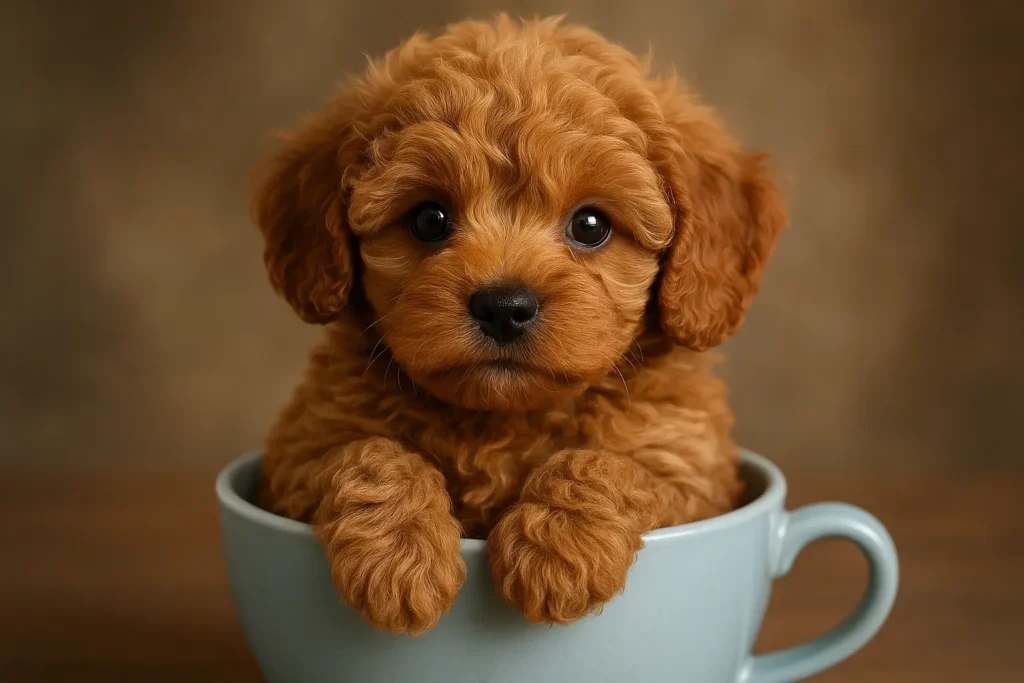
| Category | Details |
|---|---|
| Weight | 4–8 lbs |
| Lifespan | 12–15 yrs |
| Coat Type | Wavy to curly coat |
| Hypoallergenic | Often low-shedding |
| Average Price | $1,500–$4,000 |
| Monthly Cost | $120–$200 |
| Good for Apartments | Yes |
Temperament & Personality
This cross is usually affectionate, gentle, and highly attached to its household. They tend to be emotionally aware and responsive to tone and routine. Most enjoy interaction and light play, but they are not overly intense. With steady guidance, they become confident companions rather than anxious or clingy.
How Much Does a Teacup Cavoodle Cost?
Upfront cost typically falls between $1,500 and $4,000.
Ongoing monthly expenses usually range from $120 to $200, covering food, routine veterinary care, grooming, and preventive treatments.
Is Teacup Cavoodle the Right Breed for You?
This is a good match if you want a soft-tempered, people-focused companion who enjoys closeness and routine. They do well in apartments and family homes that offer consistent interaction. If you prefer a more independent dog, this may not be the ideal fit.
14. Teacup Morkie
The Teacup Morkie is a small mix between a Maltese and a Yorkshire Terrier, selectively bred for a very compact size. At this scale, temperament often blends the affectionate nature of the Maltese with the alert, spirited personality of the Yorkie. Most Morkies I see are lively, attached, and highly aware of their surroundings.
They tend to bond closely with one or two people and may become vocal if not guided early. Consistent structure helps prevent small-dog overconfidence from turning into territorial behavior. Despite their tiny size, they are engaged and interactive.
This breed suits apartment living, adults, and families with older children who understand gentle handling. Their popularity comes from their soft, often low-shedding coat and expressive face. However, as with many very small mixes, predictability in adult size and health depends on responsible breeding and realistic expectations.

| Category | Details |
|---|---|
| Weight | 3–5 lbs |
| Lifespan | 12–15 yrs |
| Coat Type | Soft, silky coat |
| Hypoallergenic | Often low-shedding |
| Average Price | $1,200–$3,500 |
| Monthly Cost | $120–$200 |
| Good for Apartments | Yes |
Temperament & Personality
The Teacup Morkie is affectionate, alert, and strongly bonded to its people. They often enjoy being involved in daily routines and can be surprisingly confident for their size. Without early boundaries, I sometimes see excessive barking or possessiveness develop. With steady guidance, they become lively but devoted companions.
How Much Does a Teacup Morkie Cost?
Purchase price generally ranges from $1,200 to $3,500.
Monthly expenses average $120 to $200, covering food, routine veterinary care, grooming, and preventive treatments.
Is Teacup Morkie the Right Breed for You?
This breed works well if you want a small, expressive companion who enjoys closeness and interaction. They fit apartment living and attentive households. If you prefer a very independent or low-engagement dog, this may not be the best match.
15. Teacup Schnauzer
The Teacup Schnauzer is a downsized version of the Miniature Schnauzer, bred to be even smaller than the already compact standard. Despite the reduced size, the personality often stays true to the breed’s roots. These dogs are alert, intelligent, and naturally watchful. They tend to be very aware of their surroundings and can make surprisingly confident little guardians.
Temperament-wise, they are loyal and responsive, but they do best with structure. Without clear boundaries, I sometimes see stubborn or territorial behavior emerge. Early socialization and consistent training help balance their protective instincts.
This breed suits owners who want a small dog with presence and personality. They adapt well to apartment living but still need daily mental engagement.
Their popularity comes from their distinctive beard, expressive eyebrows, and low-shedding coat. However, miniaturizing an already small breed requires careful attention to long-term health stability.
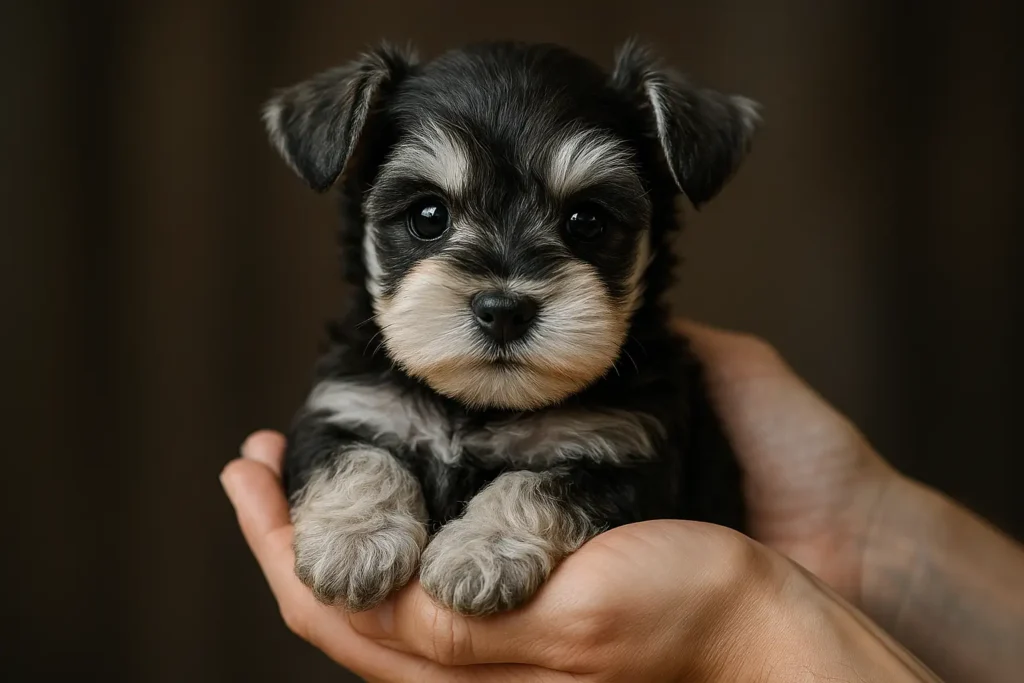
| Category | Details |
|---|---|
| Weight | 3–5 lbs |
| Lifespan | 12–15 yrs |
| Coat Type | Wiry double coat |
| Hypoallergenic | Low-shedding |
| Average Price | $1,200–$3,500 |
| Monthly Cost | $120–$200 |
| Good for Apartments | Yes |
Temperament & Personality
This dog is alert, intelligent, and naturally watchful. Even at a very small size, they tend to be confident and quick to respond to changes in their environment. They form strong bonds with their household and usually enjoy structured interaction. With early training, they are attentive companions rather than reactive barkers.
How Much Does a Teacup Schnauzer Cost?
Initial price typically ranges from $1,200 to $3,500.
Ongoing monthly care averages $120 to $200, including food, routine veterinary visits, grooming, and preventive treatments.
Is Teacup Schnauzer the Right Breed for You?
This breed fits owners who appreciate a small dog with awareness and personality. They do well in apartments but still need mental engagement and consistent boundaries. If you want a very passive, low-interaction companion, this may not be the ideal choice.
16. Teacup Zuchon
The Teacup Zuchon is a small mix between a Shih Tzu and a Bichon Frise, selectively bred for a very compact size. At this scale, they are typically affectionate, playful, and strongly companion-oriented. Most Zuchons I see are friendly and enjoy being close to their family rather than acting independently.
Their temperament tends to be gentle and adaptable. They usually respond well to calm, positive training and consistent routines. Without structure, I sometimes notice clingy behavior or attention-seeking habits develop, especially if they are overindulged because of their size.
This breed suits apartment dwellers, families with older children, and owners who want a soft-tempered lap companion. Their popularity comes from their teddy bear appearance, fluffy coat, and cheerful expression.
As with many small designer mixes, adult size and coat texture can vary slightly, so realistic expectations and careful breeder selection are important.
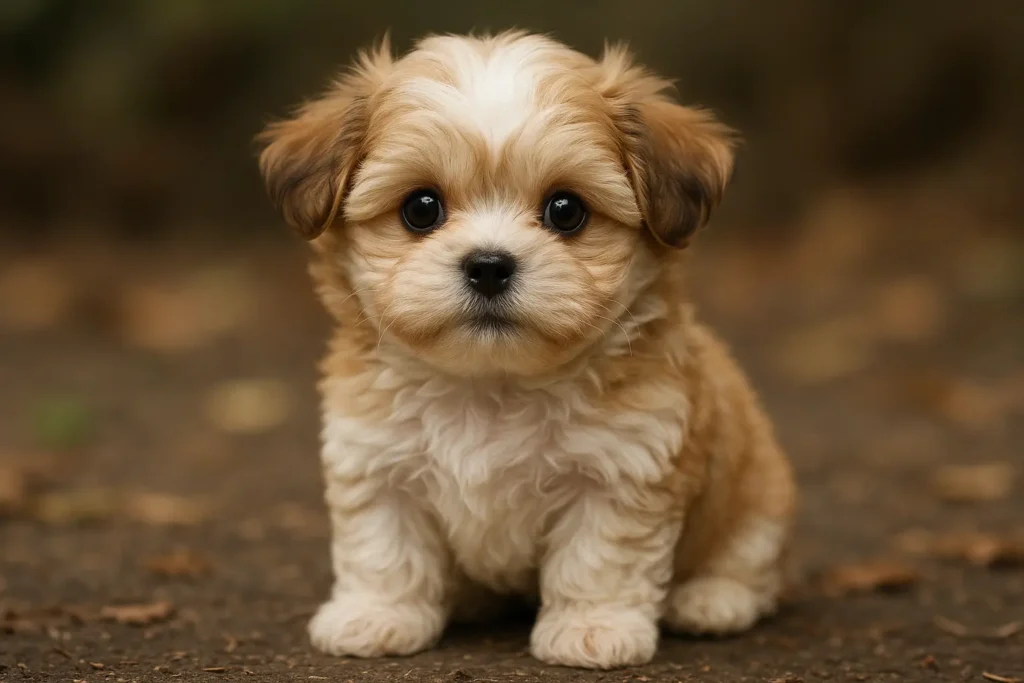
| Category | Details |
|---|---|
| Weight | 4–8 lbs |
| Lifespan | 12–15 yrs |
| Coat Type | Soft, wavy to curly coat |
| Hypoallergenic | Often low-shedding |
| Average Price | $1,500–$4,000 |
| Monthly Cost | $120–$200 |
| Good for Apartments | Yes |
Temperament & Personality
This mix is typically warm, social, and very people-centered. They enjoy attention and tend to follow their owners from room to room. Most are playful without being overwhelming, but they do best with steady routines and gentle boundaries. When guided properly, they grow into balanced, affectionate companions.
How Much Does a Teacup Zuchon Cost?
Purchase price usually ranges from $1,500 to $4,000.
Monthly care averages $120 to $200, covering food, routine veterinary care, grooming, and preventive treatments.
Is Teacup Zuchon the Right Breed for You?
This is a strong match if you want a friendly, close-contact companion who thrives indoors. They suit apartments and attentive households that can provide regular grooming and interaction. If you prefer a more independent dog, this may not be the right fit.
Cheapest Teacup Dog Breeds
If cost is a consideration, it’s important to balance affordability with health and responsible care. The dogs below tend to have lower upfront prices compared with other teacup types, but ongoing care still matters.
- Teacup Chihuahua: $800 to $3,000
- Teacup Mini Dachshund: $1,000 to $3,500
- Teacup Morkie: $1,200 to $3,500
- Teacup Shih Tzu: $1,200 to $3,500
- Teacup Pug: $1,200 to $3,500
These ranges reflect what I see in practice, but prices can vary based on local demand and individual breeder practices.
Reminder: a lower purchase price doesn’t mean low lifetime cost. Veterinary care, grooming, preventive health needs, and even specialized feeding can add up quickly with very small dogs. Always budget for long-term wellbeing, not just the initial investment.
Best Teacup Dogs for Apartments
Living in a smaller space doesn’t mean you can’t have a wonderful small companion. These teacup types tend to adapt well to apartment living when given your time, attention, and consistent routines.
- Teacup Chihuahua: Quiet energy, compact size
- Teacup Yorkshire Terrier: Alert yet adaptable
- Teacup Maltese: Gentle and low-exercise needs
- Teacup Toy Poodle: Intelligent with moderate activity
- Teacup Bichon Frise: Friendly and people-oriented
- Teacup Cavoodle: Calm inside, playful with interaction
- Teacup Morkie: Small, social, and interactive
- Teacup Schnauzer: Alert but manageable indoors
- Teacup Zuchon: Gentle companion with moderate play
These breeds typically do well with shorter walks, indoor play, and the companionship that apartment living can provide. Regardless of breed, I always recommend establishing a routine, mental stimulation, and supervised activity to keep a small dog both happy and healthy in close quarters.
Most Hypoallergenic Teacup Breeds
Some small dogs are more suitable for people with allergies because they shed less or have coat types that trap dander. “Hypoallergenic” doesn’t mean allergy-proof, but certain teacup types tend to be easier for many allergy-sensitive owners.
Quick Comparison Table
| Breed | Coat Type | Hypoallergenic | Typical Monthly Grooming | Notes |
|---|---|---|---|---|
| Toy Poodle | Curly | Yes, low-shedding | High | Needs regular grooming |
| Bichon Frise | Curly double | Often low-shedding | High | Frequent brushing & trims |
| Yorkipoo | Wavy/curly | Often low-shedding | Medium–High | Coat varies by parent |
| Cavoodle | Wavy/curly | Often low-shedding | Medium–High | Coat texture varies |
| Zuchon | Soft/curly | Often low-shedding | Medium–High | Coat can vary |
These breeds tend to produce less loose hair, which can help reduce airborne allergens. I always remind owners that allergy sensitivity is individual. Spending time with a dog before bringing one home, and maintaining regular grooming, makes a big difference in comfort and indoor air quality.
Teacup Dog Health Problems (What Most Breeders Won’t Tell You)
This is the conversation I always have privately with families before they commit to a very small dog.
When size is pushed below normal breed standards, physiology does not scale down perfectly. Organs, blood sugar regulation, bone density, and jaw structure are all affected. Very small dogs have less physical reserve, which means minor stressors can escalate faster than they would in standard-sized dogs.
Here are the issues I most commonly monitor in extremely small dogs:
| Common Teacup Issues | Why It Happens |
|---|---|
| Hypoglycemia | Tiny body mass and limited glucose reserves |
| Fragile bones | Selective mini breeding reduces bone density |
| Dental crowding | Small jaw structure limits tooth spacing |
Beyond these, I also frequently see:
- Increased anesthesia sensitivity
- Higher fracture risk from short falls
- Early periodontal disease
- Greater vulnerability to temperature changes
This does not mean every very small dog will suffer from these problems. But owners should go in informed. Realistic expectations, careful handling, structured feeding schedules, and consistent veterinary monitoring are essential for long-term stability.
Monthly Cost of Owning a Teacup Dog
One of the biggest misconceptions I see is that a smaller dog automatically means lower expenses. While food portions are smaller, medical monitoring, dental care, and grooming can balance that out.
Very small dogs often require:
- High-quality, calorie-dense food
- Routine veterinary checkups
- Dental cleanings
- Professional grooming for coated breeds
- Preventive parasite control
Here’s a realistic monthly comparison based on what I commonly see in practice:
| Breed | Food | Vet | Grooming | Total Monthly |
|---|---|---|---|---|
| Teacup Pomeranian | $25–$35 | $40–$60 | $40–$70 | $105–$165 |
| Teacup Chihuahua | $20–$30 | $40–$60 | $0–$30 | $60–$120 |
| Teacup Yorkie | $25–$35 | $40–$60 | $50–$90 | $115–$185 |
| Teacup Maltese | $25–$35 | $40–$60 | $50–$90 | $115–$185 |
| Teacup Shih Tzu | $25–$35 | $40–$60 | $50–$90 | $115–$185 |
| Teacup Poodle | $25–$35 | $40–$60 | $50–$90 | $115–$185 |
| Teacup French Bulldog | $30–$40 | $60–$90 | $20–$40 | $110–$170 |
| Teacup Pug | $25–$35 | $50–$80 | $20–$40 | $95–$155 |
| Teacup Bichon Frise | $25–$35 | $40–$60 | $50–$90 | $115–$185 |
| Teacup Mini Dachshund | $25–$35 | $40–$60 | $10–$40 | $75–$135 |
| Teacup Schnauzer | $25–$35 | $40–$60 | $40–$80 | $105–$175 |
| Teacup Pomsky | $30–$40 | $50–$80 | $40–$80 | $120–$200 |
| Teacup Cavapoo | $25–$35 | $40–$60 | $40–$80 | $105–$175 |
| Teacup Morkie | $25–$35 | $40–$60 | $40–$80 | $105–$175 |
| Teacup Yorkipoo | $25–$35 | $40–$60 | $40–$80 | $105–$175 |
| Teacup Zuchon | $25–$35 | $40–$60 | $40–$80 | $105–$175 |
These figures reflect routine care only. They do not include emergency visits, dental procedures, diagnostic testing, or insurance.
Are Teacup Dogs Ethical?
This is a question I respect deeply, and I believe every potential owner should ask it.
Breeding dogs significantly smaller than established breed standards raises important welfare concerns. Major organizations such as the American Veterinary Medical Association emphasize that breeding decisions should prioritize health, sound structure, and long-term wellbeing over appearance or market demand.
When size is pushed to extremes, risks can increase, including metabolic instability, fragile bone structure, dental overcrowding, and reproductive complications. The ethical concern is not small dogs themselves, but intentionally selecting for extreme miniaturization without prioritizing health stability.
Responsible breeding should include:
- Health testing of parent dogs
- Transparent veterinary records
- Avoidance of breeding very underweight or medically fragile dogs
- Honest discussion of potential risks
It is also important to distinguish between naturally small toy breeds and dogs marketed as “teacup” purely for premium pricing.
In my view, ethics depend on intent and practice. If health, temperament, and structural soundness are prioritized, small dogs can thrive. If size is prioritized over welfare, problems follow. Informed ownership and careful breeder selection make a meaningful difference.
Final Thoughts: Which Teacup Breed Is Right for You?
Choosing a very small dog should never be based on appearance alone. The right match depends on your lifestyle, activity level, budget, and comfort with close supervision. Some breeds thrive in quiet apartments, others need more mental stimulation. Some require intensive grooming, while others demand careful medical monitoring.
Before making a decision, I encourage you to:
- Review each breed’s temperament and care needs carefully
- Be realistic about long-term veterinary costs
- Consider your daily schedule and home environment
- Prioritize health stability over extreme size
If you are still comparing options, go back and revisit the individual breed sections above. Pay attention to personality fit, grooming commitment, and medical sensitivity.
A well-matched home makes all the difference. When expectations are clear and preparation is thoughtful, even the smallest dogs can live stable, happy lives.
Frequently Asked Questions:
What is the average lifespan of teacup dog breeds?
Most teacup dog breeds live around 10–15 years, but their small size can sometimes bring health risks that may shorten their lifespan.
Are teacup dogs good with kids?
Yes, but with caution. Teacup dogs are playful and affectionate, yet their tiny size makes them fragile, so they’re best for families with older children.
How much does it cost to own a teacup dog breed?
The initial price ranges from $1,000 to $6,000+, and monthly expenses for food, grooming, and vet care average $100–$175.

